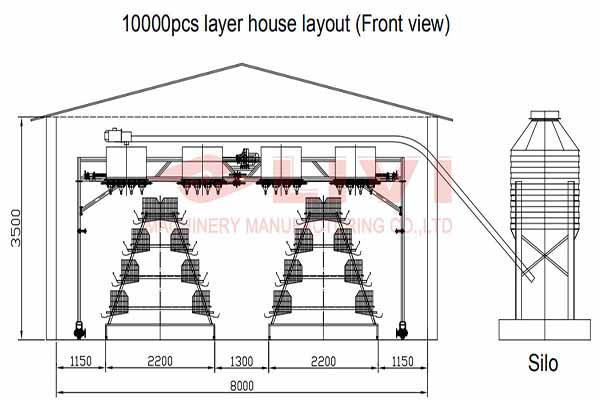Understanding the Price for Leasing Automated Equipment for Kenyan Chicken Farms
Time : 2025-06-24
Automated equipment has become an integral part of modern chicken farming, providing efficiency, accuracy, and improved productivity. In Kenya, where the poultry industry is rapidly growing, leasing automated equipment for chicken farms has emerged as a viable option for farmers seeking to enhance their operations. This article delves into the various factors that influence the price for leasing automated equipment for Kenyan chicken farms, ensuring that you are well-informed before making a decision.
Introduction to Automated Equipment in Chicken Farming
Automated equipment in chicken farming encompasses a wide range of tools and technologies designed to streamline operations. From feeders and drinkers to incubators and egg collection systems, these devices are engineered to reduce human labor, minimize the risk of disease transmission, and maximize the output of the farm. In Kenya, where labor costs can be a significant financial burden, leasing such equipment can be an attractive proposition.
Factors Influencing the Price for Leasing Automated Equipment
1. Type of Equipment
The type of equipment required for a chicken farm is a primary determinant of the leasing price. For instance, a basic automated feeding system might be more affordable than a comprehensive hatchery automation solution. The complexity and the level of technology involved in the equipment will directly affect its cost.
2. Brand and Manufacturer
Well-known brands and manufacturers often command a premium due to their reputation for quality and reliability. However, in the case of leasing, the brand might not have as significant an impact as it does when purchasing. Yet, it is essential to consider the brand’s after-sales service and customer support.
3. Size of the Chicken Farm
The size of the chicken farm will influence the scale of the equipment needed. Larger farms require more extensive automation to cater to the increased number of birds. Consequently, the leasing price will reflect the size and capacity of the equipment.
4. Maintenance and Support
Leasing agreements may include maintenance and support packages, which can add to the overall cost. While these packages are beneficial for ensuring the longevity and efficiency of the equipment, they should be carefully considered in the context of the farm’s budget.
5. Leasing Duration
The length of the leasing period will also impact the price. Longer leasing agreements often result in lower monthly payments, but the total cost over the lease period might be higher than purchasing the equipment outright.
6. Market Conditions
Economic factors, such as inflation rates and currency fluctuations, can influence the leasing price. Additionally, the availability of financing options from equipment suppliers can affect the overall cost for the farmer.
Benefits of Leasing Automated Equipment for Kenyan Chicken Farms
1. Cost-Effectiveness
Leasing equipment allows chicken farmers to access high-quality technology without a significant upfront investment. This can be particularly beneficial for small and medium-sized farms that might not have the capital to purchase expensive equipment.
2. Flexibility
Leasing provides the flexibility to upgrade equipment as technology advances and as the farm grows. This adaptability is crucial in a dynamic industry like poultry farming.
3. Reduced Risk
With leasing, the responsibility for maintenance and repair lies with the leasing company. This shift in risk can alleviate some of the financial burden on the farmer.
Case Study: Leasing Automated Equipment for a Kenyan Chicken Farm
Consider a Kenyan chicken farm that requires an automated feeding system. After evaluating their needs, the farm manager decides to lease a system from a reputable supplier. The leasing agreement includes a maintenance package and can be tailored to fit the farm’s financial capabilities. Over a three-year period, the farm benefits from improved feeding efficiency and reduced labor costs, making the leasing decision a sound investment.
Conclusion
Leasing automated equipment for Kenyan chicken farms offers numerous advantages, including cost-effectiveness, flexibility, and reduced risk. Understanding the factors that influence the leasing price allows farmers to make informed decisions that align with their operational needs and financial goals. When considering leasing options, it is essential to evaluate the type of equipment, brand, farm size, and the terms of the leasing agreement to ensure a successful and profitable venture.












